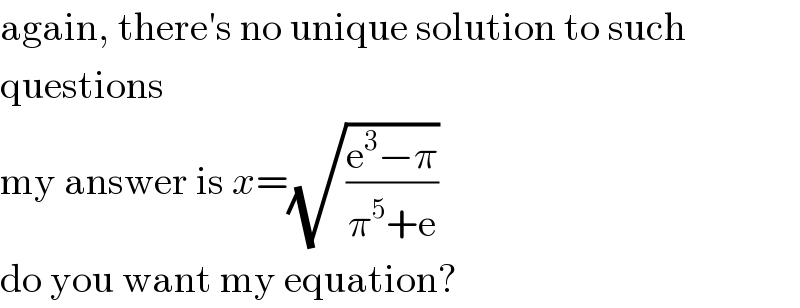Question Number 87860 by naka3546 last updated on 06/Apr/20

Commented by MJS last updated on 06/Apr/20

$$\mathrm{again},\:\mathrm{there}'\mathrm{s}\:\mathrm{no}\:\mathrm{unique}\:\mathrm{solution}\:\mathrm{to}\:\mathrm{such} \\ $$$$\mathrm{questions} \\ $$$$\mathrm{my}\:\mathrm{answer}\:\mathrm{is}\:{x}=\sqrt{\frac{\mathrm{e}^{\mathrm{3}} −\pi}{\pi^{\mathrm{5}} +\mathrm{e}}} \\ $$$$\mathrm{do}\:\mathrm{you}\:\mathrm{want}\:\mathrm{my}\:\mathrm{equation}? \\ $$
Commented by MJS last updated on 06/Apr/20

$$\mathrm{polynome}\:\mathrm{degree}\:\mathrm{4}\:\mathrm{gives}\:{x}=−\mathrm{49} \\ $$
Commented by naka3546 last updated on 07/Apr/20

$${yes},\:{I}\:\:{agree}\:\:{with}\:\:{you},\:{sir}. \\ $$$${There}\:\:{is}\:\:{no}\:\:{an}\:\:{unique}\:\:{solution}\:. \\ $$$${Thank}\:\:{you},\:\:{sir}. \\ $$
